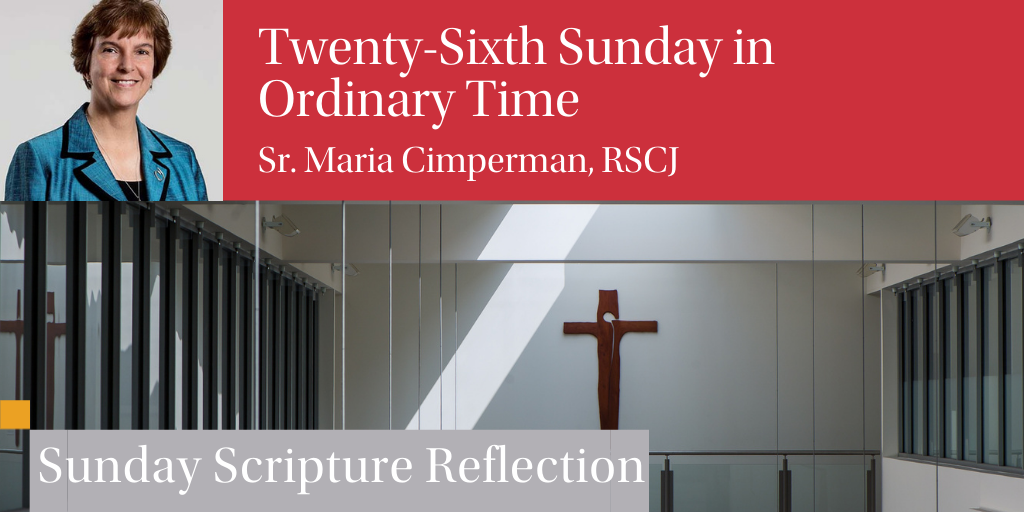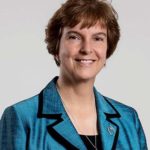

Readings:
Reading 1: Numbers: 11: 25-29
Responsorial Psalm: Psalm: 19:8, 10, 12-13, 14
Reading 2: James 5:1-6
Gospel: Mark: 9: 38-43, 45, 47-48
What Is Holding You Back? Let it Go – or Get Rid of It
A phenomenon noted in US media the past year and in the midst of the Covid-19 pandemic has been the number of persons who are leaving jobs and making new choices about professions. A friend shared that a niece left a high status, high-paying position in technology and is now back in school to prepare to go into the classroom and teach young people. Another friend has moved across the country to a position that will allow him to offer his gifts in a ministry that also values his desire for sufficient time with his family. The pandemic is putting enough of a ‘pause’ in lives to open spaces for persons to choose again. (This is, of course, for those who are fortunate at this time to have employment.) People are choosing.
Additionally, Pope Francis, in Let Us Dream: The Path to a Better Future, offers these words about the time in which we are living:
• To enter into crisis is to be sifted. Your categories and ways of thinking get shaken up; your priorities and lifestyles are challenged. You cross a threshold, either by your own choice or by necessity, because there are crises, like the one we are going through, that you can’t avoid.
• The basic rule of a crisis is that you don’t come out of it the same. If you get through it, you come out better or worse, but never the same.
• The fact is that we are all tested in life. It’s how we grow…you have to choose.
• When people’s hearts are tested they become aware of what has held them down. They also feel the presence of the Lord, who is faithful, and responds to the cry of the people. The encounter that follows allows a new future to open up.
This Sunday’s readings invite us to look at our choices and who we are following and what way we are going. Are our choices leading to God and one another or away from God and the good of one another?
Three types of choices may be found in the readings. Choices begin with us. The gospel speaks with obvious exaggeration (“If your hand causes you to sin, cut it off….”) to help us understand the seriousness of our choices for ourselves and our impact on those around us. Self-mutilation is not God’s intent, but the words are meant to grab our attention. What choices lead me to God and away from God? What holds me back – from living the life I sense calling in my depths? If too much time online is holding you back from the quieting your being longs for, turn off or at least silence your phone/computer, etc. If the people you spend time with (work/leisure/community/family/friends) are not encouraging the best forth from you, choose. Create boundaries and open spaces in your life for others. The Letter from James this past week names many feelings that God longs to enter into with us – resentment, anger, envy, etc – and to transform. Let God in.
There’s more! Mark offers strong language about how we are to be with others: “Whoever scandalizes one of these little ones who believe in me, it would be better if a great millstone were put around that person’s neck and the person were thrown into the sea.” Commentators in Sacra Pagina offer “put stumbling blocks in the way of” as a way to further convey the message of ‘scandal’ to us as individuals and communities.
The currently calcifying polarization among some church leaders and elected public servants is scandalous and a stumbling block. Pope Francis also reminds us that in this crisis it is “not just particular individuals who are tested, but entire peoples.” At the same time, we must each regularly reflect how we might put stumbling blocks in the way of goodness growing in those around us through acts of omission (not complimenting the good we see) or commission (gossip – a constant refrain from Pope Francis), thus making life more difficult for one another.
Thirdly, in our readings, Moses and Jesus remind the people to not seek to determine or limit what God is capable of doing. The Spirit is far more creative and free than any of us or our communities. Our companions on the journey are not only the members of our particular faith communities. As early as 1963, in his desire to build peace in an increasingly precarious world, Saint Pope John XXIII, addresses his encyclical Pacem in Terris (Peace on Earth), to “all people of goodwill.” Catholic social teaching continues to follow this desire. Our call is to listen to the whispers and the shouts of the Spirit everywhere. Our community of common cause is vast, encompassing all creation.
So we are called to let go of what holds back our participation in the Reign of God, trusting that even in these crises God is ever-present, welcoming us. We have opportunities to come out of this crisis better as a community. The current call to each of us to participate in a synodal process is one such local and global effort. (See: https://press.vatican.va/content/salastampa/en/bollettino/pubblico/2021/09/07/210907a.html)
Pope Francis urges us, in the way of our readings:
• This is a moment to dream big, to rethink our [personal, communal, societal, ecclesial] priorities – what we value, what we want what we seek – and to commit to act in our daily life on what we have dreamed of.
Invitation to Reflection:
• What do you need to let go of to live from your deepest values?
• What choices will allow you to move forward and “allow a new future to open up?”
Sr. Maria Cimperman, RSCJ
Associate Professor of Theological Ethics
Director, Center for the Study of Consecrated Life